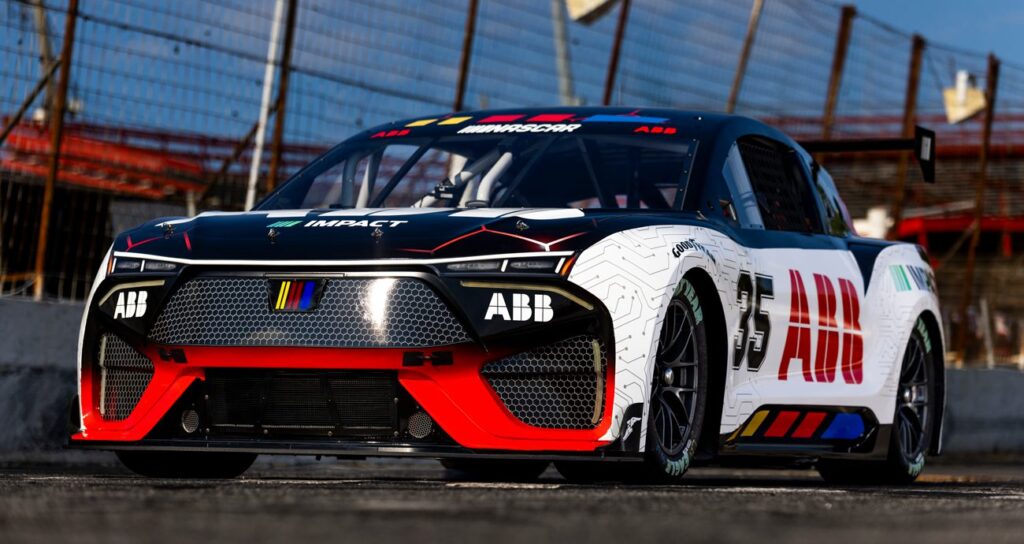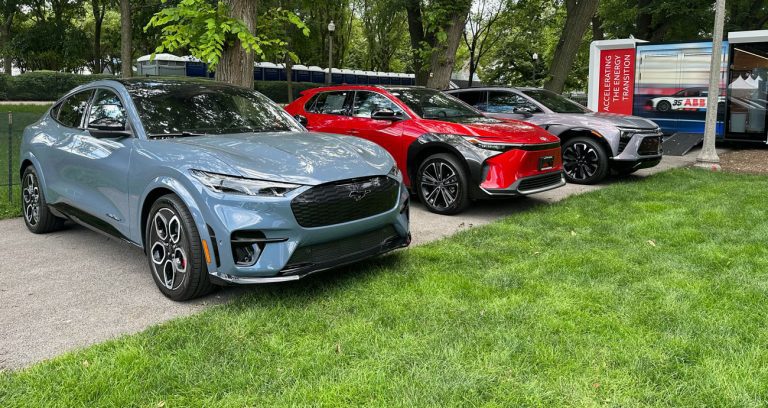NASCAR, ABB Reveal EV Prototype, Launch Partnership
On July 6, 2024, NASCAR and ABB announced the ABB NASCAR Electrification Innovation Partnership and revealed a historic new EV prototype at the Chicago Street Race. NASCAR Impact is the sanctioning body’s platform driving NASCAR’s mission to strengthen its communities and contribute to a healthier planet through electrification of its racecars, among other sustainability efforts. ABB became the first official partner of NASCAR Impact, helping NASCAR achieve public sustainability targets around electrification and electric vehicle charging.

“ABB is a technology leader in electrification and automation, and we help customers globally to optimize, electrify and decarbonize their operations,” said Ralph Donati, ABB Executive Vice President. “The objective of the collaboration between NASCAR, ABB in the United States and the NASCAR industry is to push the boundaries of electrification technology, from EV racing to long-haul transportation to facility operations.”
This partnership marks a significant step in NASCAR’s efforts to embrace sustainability and innovation in the motorsport industry. The introduction of an EV prototype at the Chicago Street Race highlights NASCAR’s commitment to reducing its environmental footprint and promoting electric vehicle technology. ABB’s expertise in electrification and automation will likely play a crucial role in developing and integrating these new technologies within NASCAR’s framework.
NASCAR Commits to Decarbonizing Operations by 2035
NASCAR’s dual commitment to maintaining the legacy of combustion engines in racing while pursuing aggressive decarbonization goals showcases a balanced approach to honoring tradition and embracing sustainability. By aiming to reduce its carbon footprint to zero across core operations by 2035, NASCAR is setting a clear path towards a more sustainable future.
Electrification and innovative solutions, supported by partnerships like the one with ABB, will be essential in achieving these goals. This strategy involves:
- Developing and integrating electric vehicles (EVs) into its fleet.
- Implementing energy-efficient technologies and practices at race tracks and events.
- Leveraging renewable energy sources for power needs.
- Collaborating with stakeholders and fans to promote sustainable practices and awareness.
This ambitious target aligns with broader trends in the automotive and sports industries towards sustainability and could have a significant impact on the perception and evolution of motorsport.
“There could not be a more optimal moment in time to announce our first Impact partner than in tandem with the debut of the ABB NASCAR EV Prototype at the Chicago Street Race,” said Eric Nyquist, NASCAR Senior Vice President and Chief Impact Officer. “ABB is an industry leader and will help in efforts to decarbonize our operations as we pursue achieving net-zero operating emissions over the next decade.”
The introduction of the ABB NASCAR EV Prototype signifies a major milestone in NASCAR’s evolution towards electrification. This prototype represents the cutting-edge work from the NASCAR Research & Development Center, which has already demonstrated its capabilities through the overhaul of the NASCAR Cup Series car with the Next Gen model.

Key Highlights of the ABB NASCAR EV Prototype
Collaborative Development: The prototype was developed with input and collaboration from major automotive manufacturers, including Chevrolet, Ford, and Toyota. This ensures that the EV prototype benefits from the expertise and technological advancements of these leading OEMs.
Next Gen Car Influence: The engineers who worked on the Next Gen car and the Garage 56 project for the 24 Hours of Le Mans also contributed to the development of the EV prototype. The Next Gen car, which debuted in 2022, marked a significant modernization effort in NASCAR, aligning race cars more closely with production cars and reintroducing the ‘stock’ aspect of stock car racing.
Innovative Design: The prototype embodies the latest innovations and technological advancements from the NASCAR Research & Development Center. It aims to be a forward-looking vehicle that aligns with NASCAR’s sustainability goals while still maintaining the performance and excitement associated with NASCAR racing.
Sustainability Goals: The development of the EV prototype is a crucial step in NASCAR’s broader strategy to decarbonize its operations by 2035. This initiative is part of NASCAR’s commitment to reducing its carbon footprint and adopting more sustainable practices.
Key Features of the ABB NASCAR EV Prototype
- Powertrain and Motors:
- Three STARD UHP 6-Phase Motors: The car is equipped with one motor at the front and two at the rear, providing power to all four wheels. This setup enables high performance and agility, particularly suited for road courses and short oval tracks.
- Peak Power: The tunable powertrain can produce up to 1,000 kW (approximately 1,340 horsepower) at peak power, ensuring competitive speed and acceleration.
- Battery and Energy Management:
- 78-kWh Liquid-Cooled Battery: This large battery capacity allows for significant energy storage and extended performance on the track.
- Regenerative Braking: The regenerative braking system converts kinetic energy back into electrical power, enhancing efficiency and sustainability by extending the car’s range and reducing the need for frequent charging.
- Design and Construction:
- Sustainable Flax-Based Composite Body: The use of flax-based composite materials for the body highlights a commitment to sustainability and innovation in material science.
- CUV Body Style: The generic Crossover Utility Vehicle body style offers a modern and versatile look, potentially increasing appeal to a broader audience.
- Next Gen Chassis: The modified chassis from the Next Gen car ensures structural integrity and familiarity for NASCAR teams and drivers.
- Components Derived from NASCAR Cup Series Car: The prototype incorporates steering, suspension, brakes, and wheels from the NASCAR Cup Series car, ensuring high performance and reliability.
Strategic Implications
Sustainability and Innovation: The use of sustainable materials and advanced electrification technologies positions NASCAR as a leader in motorsport sustainability.
Performance and Relevance: By maintaining high-performance standards and incorporating elements from production cars, NASCAR ensures the EV prototype remains relevant and exciting for fans and aligns with the sport’s heritage.
Versatility: The all-wheel-drive system and regenerative braking make the car well-suited for various track types, enhancing its versatility and potential use in different racing scenarios.
Potential Impact
Fan Engagement: The innovative features and sustainability focus may attract a new generation of fans interested in environmentally friendly technologies.
Industry Influence: NASCAR’s commitment to electrification and sustainability could influence other motorsport organizations and the broader automotive industry to pursue similar initiatives.
Technological Advancements: Collaborations with OEMs like Chevrolet, Ford, and Toyota could drive further advancements in EV technology and performance, benefiting both racing and consumer vehicles.
NASCAR Impact Launched to Support Sustainability
The partnership between ABB and NASCAR under the NASCAR Impact platform represents a comprehensive effort to promote sustainability and community engagement within the motorsport industry.
ABB’s role as a founding partner underscores its commitment to supporting NASCAR’s sustainability and social initiatives. The partnership aims to drive NASCAR’s mission to reduce its carbon footprint to zero across its core operations by 2035.
Sustainability Commitments:
Scope 1 to Scope 2 Transition: NASCAR is shifting its operations from fuel-burning (Scope 1) to electric-powered (Scope 2) systems, which is central to its sustainability strategy.
Renewable Electricity by 2028: NASCAR has committed to sourcing 100% renewable electricity for its owned race tracks and facilities by 2028, marking a significant step towards reducing carbon emissions.
Waste Diversion and EV Charging: Expanded efforts in waste diversion and the installation of on-site EV charging stations are part of NASCAR’s immediate sustainability priorities.
Annual Carbon Measurement: Regular carbon footprint assessments help inform and prioritize sustainability initiatives.
Role of ABB
ABB will provide guidance, equipment, and support in electrifying key elements of NASCAR’s operations, helping to achieve the long-term emissions goals. This collaboration leverages ABB’s expertise in electrification and automation to enhance NASCAR’s sustainability efforts.
Upcoming Event – Chicago Street Race
Date and Time: The NASCAR Cup Series season continues with the Chicago Street Race on Sunday, July 7 at 4:30 p.m. ET.
Broadcast: The event will be broadcast on NBC, MRN, and SiriusXM NASCAR Radio.
Event Highlights: This race is a unique sports and entertainment festival held in downtown Chicago, showcasing the excitement of NASCAR racing in an urban setting.
The ABB NASCAR Electrification Innovation Partnership
The ABB NASCAR Electrification Innovation Partnership and the broader NASCAR Impact platform represent significant strides towards a more sustainable and socially responsible future for NASCAR. By integrating advanced electrification technologies and committing to renewable energy, NASCAR is taking concrete steps to reduce its environmental impact while maintaining the excitement and performance that define the sport.
Formula E: A Groundbreaking Chapter in All-electric Motorsport
ABB is also partnered with Formula E, an all-electric racing series. Since its launch in 2014, Formula E has rapidly evolved, pushing the boundaries of electric vehicle technology and promoting sustainability within the realm of competitive racing.
Formula E represents a revolutionary chapter in the world of motorsport, specifically focusing on electric-powered single-seater racing cars. This championship showcases cutting-edge technology and innovative approaches to racing, setting the standard for sustainable motorsport.
Key Features of Formula E
Electric Racecars: Formula E exclusively features electric-powered single-seater racecars, emphasizing the potential and performance of electric vehicles (EVs) in competitive racing. These cars are equipped with advanced electric drivetrains, showcasing the latest in battery technology and energy management systems.
Sustainability Focus: The championship highlights the importance of sustainability in motorsport, aligning with global efforts to reduce carbon emissions and promote renewable energy. Races are often held in urban environments, bringing the excitement of motorsport to city centers while promoting electric mobility.
Technological Innovation: Formula E serves as a platform for testing and developing new technologies that can be transferred to consumer electric vehicles, driving advancements in the automotive industry. The series attracts major automotive manufacturers and technology companies, fostering a competitive environment for innovation.
Fan Engagement: Formula E incorporates unique elements such as “Fanboost,” where fans can vote to give their favorite drivers a temporary boost of power during the race. The series also emphasizes accessibility and engagement with fans through various digital and interactive platforms.
Leadership in Sustainable Motorsport: By focusing exclusively on electric racecars, Formula E positions itself as a leader in the sustainable motorsport movement. The championship sets an example for other racing series to incorporate electric and hybrid technologies, pushing the boundaries of traditional motorsport.
Impact on the Automotive Industry: The technologies and innovations developed in Formula E have direct applications in the consumer automotive market, accelerating the development of more efficient and powerful electric vehicles. Collaboration with major automotive manufacturers like Audi, BMW, Mercedes-Benz, and Porsche enhances the relevance and impact of the series.
Urban Racing Experience: Hosting races in city centers makes Formula E more accessible to a broader audience and highlights the benefits of electric mobility in urban environments. This approach not only promotes the sport but also raises awareness about the importance of sustainable transportation.
